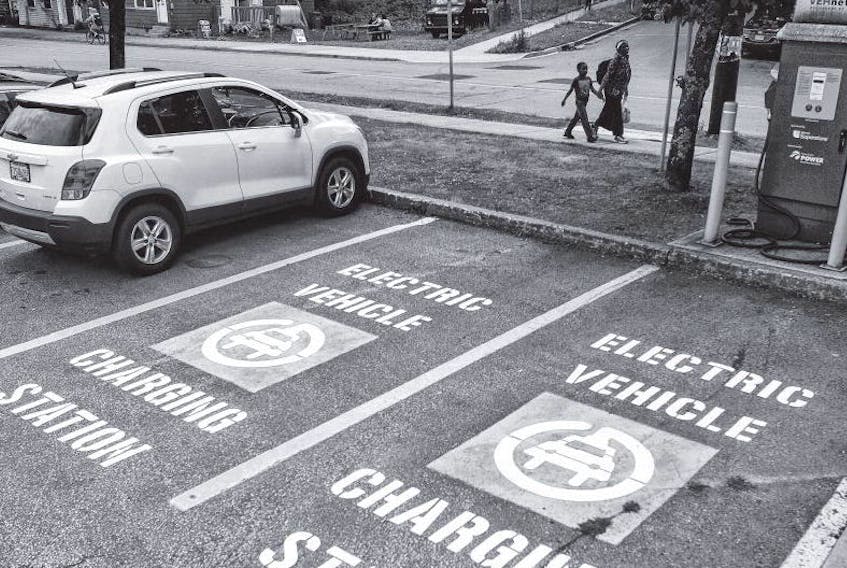The provincial regulator has nixed Nova Scotia Power Inc.’s plan to pass the cost of setting up a dozen electric vehicle charging stations across Nova Scotia on to ratepayers.
NSPI went to the Nova Scotia Utility and Review Board looking for approval to spend nearly $420,000 in its annual capital expenditure program on the $884,000 project that was slated to get most of its remaining funding from a Natural Resources Canada grant. The company had requested that ratepayers pick up its portion of the the tab for the charging stations, which were slated to open at the end of March.
“The board finds that the evidence does not support the need for NSPI to be the owner of the (electric vehicle) charging stations to accomplish the declared purpose of this project, which is to study the impact on the power system,” said the decision released Thursday.“To be prudent NSPI should research the load patterns of the (electric vehicle) charging stations and the impact they may have on the electricity system. The cost of the devices to measure the impacts, as needed, may be a capital cost to the ratepayers depending on the particular circumstances of the infrastructure.”
The cost of the charging stations has nothing to do with distributing electricity, said the decision.
“NSPI does not need to be the owner of the (electric vehicle) charging stations in order to measure the impact on the system and ensure there are no adverse impacts to other customers,” it said.
The company had proposed setting up 12 stations along the province’s major highways about 65 kilometres apart to make it practical for electric vehicles to travel long distances. It had planned to buy the stations from the largest electric vehicle network in Canada, the AddEnergie FLO Network, which was to operate them for 15 years.
Users were going to pay $2.50 for every 15 minutes of charging.
“There could be limitations to a pilot project inwhich the company did not have ownership of
the charging stations,” NSPI said in its submissions to the regulator. “Granular charging data is required to effectively measure the system impacts of fast charging and access to this data is typically only provided to network operators.”
But the province’s small business advocate said it wasn’t “necessary or appropriate” for NSPI to undertake the project on the ratepayer’s dime.
“It is not appropriate for NSPI to enter a new type of business, funded by ratepayers, to compete against businesses and schools,” argued Bedford lawyer Nelson Blackburn.
“This is a competitive industry in the transportation sector, not an essential public service for power delivery.”
The province’s consumer advocate said the proposed $2.50 fee for 15 minutes of charging is “artificially low.”
It would “skew adequate assessments of the (electric vehicle) charging load shape and the adoption of (electric) vehicles, which are the goals of this pilot project,” Halifax lawyer John Merrick said in submissions to the board.
NSPI countered that the proposed price “is a typical fee for customers using fast charging stations within AddEnergie’s FLO network across Canada.”
The small business advocate had “significant concerns about NSPI’s role in the growing (electric vehicle) charging market and the financial impact it could have on Nova Scotia ratepayers.”
There is no evidence that these charging stations are essential or necessary, Blackburn said.
“But there is evidence that all the risks associated with them will be borne by Nova Scotia ratepayers. In addition, NSPI has overstated the benefits the charging stations will provide, both to the environment and to increased (electric vehicle) adoption. The (small business advocate) submits that it is not appropriate for NSPI to undertake this project, given the financial implications to both ratepayers and businesses who would be competing with the charging stations.”
Nova Scotia’s Environment
Department supported the project.
“While it notes that (electric vehicle) adoption has lagged ‘somewhat’ in Nova Scotia, due in part to the lack of a network of fast charging stations along major highways, it argues that this project fulfills several objectives,” said the decision, including reducing greenhouse gas emissions, enabling early electric vehicle adopters to travel the province “without unusual range constraints,” and studying the increased load the vehicles will place on the system.
NSPI wasn’t sure Thursday if the project will go ahead or not now that it can’t pass the cost on to ratepayers.
“Right now we’re focused on the storm that’s currently hitting Nova Scotia and restoring power to our customers,” said Tiffany Chase, who speaks for the power utility, on Thursday.
“We’ll have more time to consider the path forward after the storm.”
The regulator needs to approve any expenditures that are put into electricity rates, said Paul Allen, the executive director of the review board.
“The usual rule of thumb is whoever uses the power pays the bill,” Allen said.









